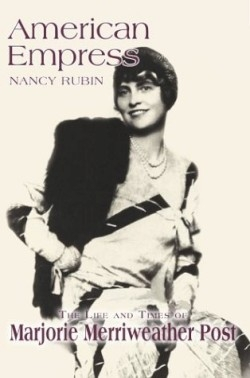American Empress
The Life and Times of Marjorie Merriweather Post
Marjorie Merriweather Post (1887-1973) was, in many ways, a foremother and role model for contemporary professional women. The daughter of C.W. Post, an entrepreneur who made his fortune in pre-packaged foods, Marjorie’s earliest memories are of gluing cereal boxes in the family’s barn. The family’s money allowed her to live in luxury, travel, attend the finest schools for young women, and meet the best young men from the wealthiest families. She became a board member of the company at an early age, and her father’s suicide forced her into running the business at twenty-seven. As sole heir, she found work to be a constant in her life, despite the advantages of affluence.
Post idealized her father. His disapproval of her first husband, paired with his death, caused her to rethink her future. Her second marriage, to stockbroker E. F. Hutton, seemed a more suitable match. Equally ambitious, they forged together the alliance that transformed the Postum Cereal Company into the corporation now known as General Foods. Hutton brokered Post’s purchases of Jell-O, Sanka, and Birds Eye Frosted Foods. Their combined wealth and social standing gave them the opportunity to mingle with everyone who was anyone in politics and high society.
The author, an award-winning journalist and writer-producer who specializes in women and social history, has contributed to publications like The New York Times and The Stanford Advocate. Her previous books include The New Suburban Woman and the biography Isabella of Castile, for which she received the 1992 Author of the Year Award from the American Society of Journalists and Authors.
Her biography of Post offers a dignified and interesting look at a complicated woman. Married four times and the mother of three daughters, Post lived a private life marked by private disappointments, public scandals, gossip, and drama. Her third marriage, to Washington lobbyist Joseph Davis, FDR’s ambassador to the Soviet Union, earned her the title “Queen of Washington, D.C.” During this marriage, Post, now in middle age and always a generous philanthropist, started funding civic and artistic causes, including the National Symphony Orchestra, the Washington Ballet, and the Kennedy Center. She often requested that her donations remain anonymous for fear that others would not give if they felt that Post would completely underwrite projects.
Friends described Marjorie Merriweather Post as warm and generous. She wore with ease the various mantels of socialite, businesswoman, trendsetter, hostess, philanthropist, and mother. At home in most worlds, she held once-a-week square-dance parties, practiced Christian Science, and used earthy language when appropriate.
This thorough, engaging book includes notes, bibliography, and photographs that offer a well-researched look at the Jazz Age, business practices of the last century, and a life lived with enormous wealth and grace.
Reviewed by
Pam Kingsbury
Disclosure: This article is not an endorsement, but a review. The publisher of this book provided free copies of the book to have their book reviewed by a professional reviewer. No fee was paid by the publisher for this review. Foreword Reviews only recommends books that we love. Foreword Magazine, Inc. is disclosing this in accordance with the Federal Trade Commission’s 16 CFR, Part 255.

